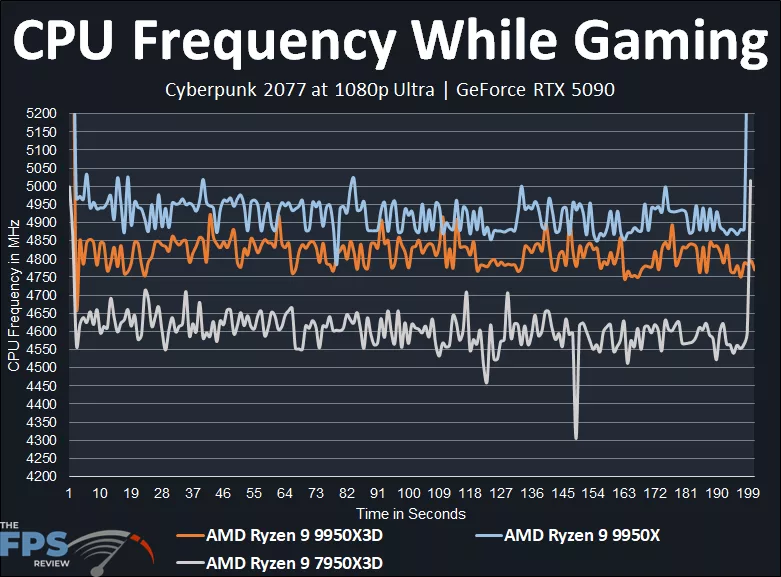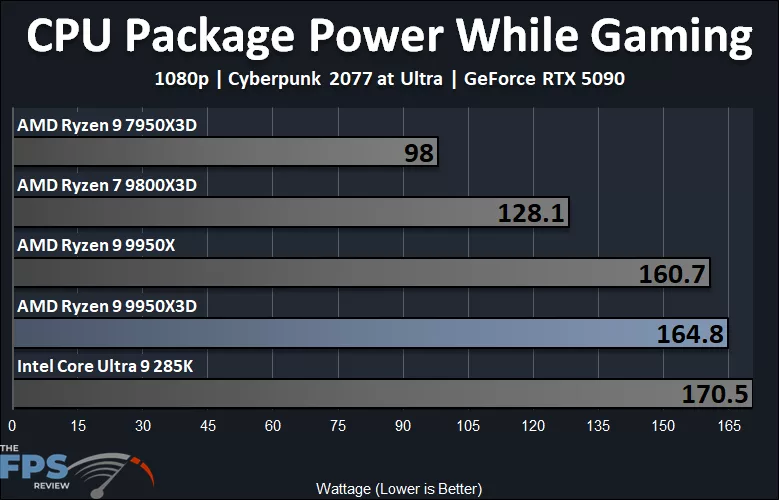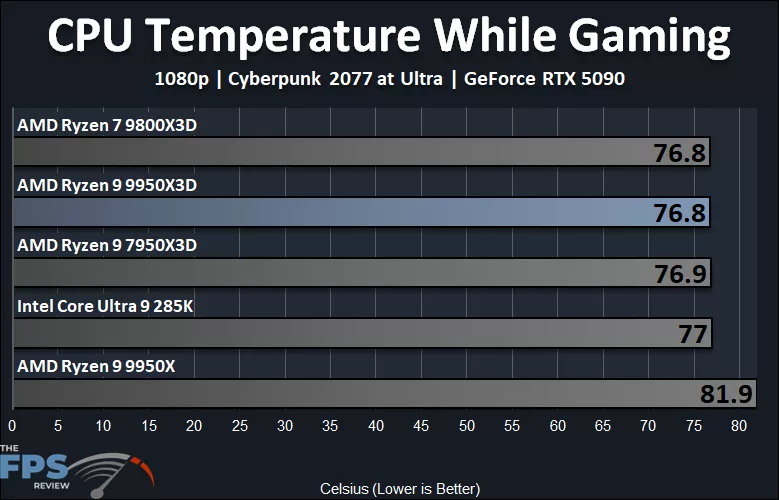Gaming Power, Temp, and Clock Speed
On this page, we are going to explore the power, temperature testing, and CPU frequency that we experienced on the AMD Ryzen 9 9950X3D in gaming. That’s right, this is a gaming-focused power, temp, and CPU clock speed testing that you will see below. The power, temp, and clock speed graphs below are not stress tests, it is not pushing the CPU as hard as possible. The graphs below indeed show the power, temp and clock speed while simply playing a game, in this case Cyberpunk 2077 at 1080p Ultra with a manual run-through.
Gaming CPU Clock Speed

In the graph above, we are graphing the CPU clock frequency while gaming in Cyberpunk 2077 at 1080p Ultra in a manual run-through. The AMD Ryzen 9 9950X3D has a CPU frequency of 4.3GHz with a turbo clock frequency of up to 5.7GHz, the AMD Ryzen 9 7950X3D has a CPU frequency of 4.2GHz with a turbo clock frequency of up to 5.7GHz, and the AMD Ryzen 9 9950X has a CPU frequency of 4.3GHz with a turbo clock frequency of up to 5.7GHz.
In our gaming session, which does not push all the cores, mind you, you can see how the three CPUs compare on clock frequency. What we can see here is that the AMD Ryzen 9 9950X3D is running at a much higher frequency while gaming compared to the previous generation AMD Ryzen 9 7950X3D. There has been a pretty big improvement in clock speed compared to the previous generation Zen 4 X3D CPU.
Where the AMD Ryzen 9 7950X3D was running between 4.550GHz-4.650GHz, the new AMD Ryzen 9 9950X3D is now running in the 4.750GHz-4.850GHz range while gaming. That is about a 200MHz increase in clock speed with the new AMD Ryzen 9 9950X3D compared to the previous generation Ryzen 9 7950X3D while gaming, showing a positive improvement in performance.
We also can see that the AMD Ryzen 9 9950X3D runs at a lower clock speed compared to the non-X3D AMD Ryzen 9 9950X. The AMD Ryzen 9 9950X runs between 4.850GHz-4.950GHz while gaming, meaning it’s about 100MHz faster while gaming, or to put it another way, the AMD Ryzen 9 9950X3D is about 100MHz slower than the Ryzen 9 9950X while gaming. The X3D cache makes up for that frequency difference and provides faster performance, so if the AMD Ryzen 9 9950X3D did not have that cache, it would technically be slower in-game, but the whole point of it is that X3D cache.
Gaming CPU Power

In the graph above, we are comparing the CPU package power while gaming. The AMD Ryzen 9 9950X3D has a TDP of 170W and a PPT of 230W, the Ryzen 9 7950X3D has a TDP of 120W and a PPT of 162W, the Ryzen 9 9950X has a TDP of 170W and a PPT of 230W, the Ryzen 7 9800X3D has a TDP of 120W and a PPT of 162W.
In our power testing while gaming, the AMD Ryzen 9 9950X3D does consume the second most power, with the Intel Core Ultra 9 285K consuming the most power while gaming, yet the lowest performance while gaming. The AMD Ryzen 9 9950X3D does consume 68% more power than the AMD Ryzen 9 7950X3D while gaming, which is quite a bit more, but we did see the AMD Ryzen 9 9950X3D also running 200MHz higher while gaming, so the frequency was higher. The AMD Ryzen 9 9950X3D consumes 29% more power than the AMD Ryzen 7 9800X3D, which typically was the faster CPU, for less power draw while gaming. Finally, the AMD Ryzen 9 9950X3D consumes 3% more power than the Ryzen 9 9950X non-X3D part.
Gaming CPU Temperature

In the graph above, we are taking a look at the CPU temperatures while gaming in Cyberpunk 2077 at 1080p Ultra in a manual run-through. The AMD Ryzen 9 9950X actually ran the hottest while gaming at nearly 82C, which was interesting. However, the AMD Ryzen 9 9950X3D ran rather cool compared to the other CPUs; it was on par with the AMD Ryzen 7 9800X3D and AMD Ryzen 9 7950X3D. The Intel Core Ultra 9 285K didn’t do too badly here either, but certainly, the AMD Ryzen 9 9950X3D is a cooler-running CPU than the Ryzen 9 9950X while gaming.
